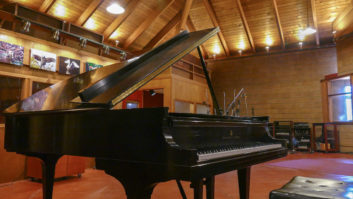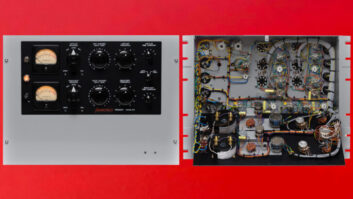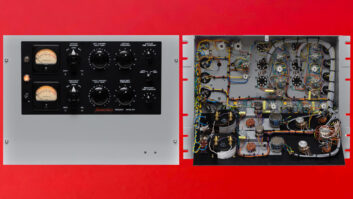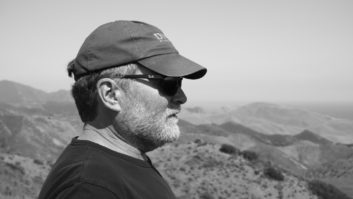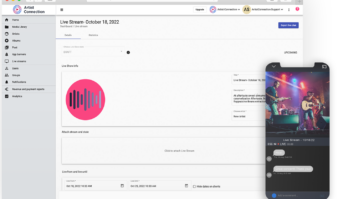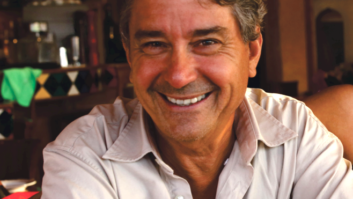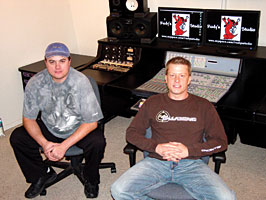

Let’s get this out of the way: Rudy is a little dachshund, not an engineer. Mark Obermeyer, the owner of Rudy’s Studio (and of the dachshund), is a musician/engineer/producer and a champion of Denver’s hard-rock scene. During the past 10 years, he has recorded more than 100 local bands in his studio (www.rudysstudio.com). He says he and his associate, Justin Preston, make it their job to help those bands grow. “We’re into producing bands and challenging them to be more when they leave here than they were when they came in,” says Obermeyer.
Like many project studio owners, Obermeyer’s background includes playing in bands. He was also enrolled in University of Colorado at Denver’s Recording Arts program. “I was lucky to take classes with Roy Pritts and Rich Sanders,” Obermeyer says. “Those guys taught me so much about recording — digital and analog. Roy worked at Caribou [Ranch Studio], and he brought a lot of gear down to UCD when Caribou closed. So we were lucky enough to use that Neve board from Caribou.”
Engineers Justin G. Preston (left) and Mark Obermeyer can take projects from demo through mastering at Rudy’s Studio.
Obermeyer opened his own studio in 1997. The connections he developed as a musician and as a student gave him a built-in client base from the start. Within a couple of years, he had developed a working relationship with Preston, a fellow rock musician/engineer who had been doing mastering projects in his own facility, Dragon Studios. In 1999, Preston began working primarily with Rudy’s. “When I started the studio, it was just a little demo studio,” Obermeyer recalls, “but when Justin came along, it grew. He had a Pro Tools rig when I was still fussing with [Tascam] DA-38 machines.”
Preston is also skilled at designing CD art and Websites. “We’re a good team,” Preston says. “We fill in each other’s gaps in terms of our talents.”
Obermeyer says he and Preston have completely gutted Rudy’s Studio three times since he started. The latest redesign happened two years ago, when they upgraded to Pro Tools HD3. Obermeyer hired Alan Baca of Pro Audio Services to help refurbish the rooms. In addition to the new Pro Tools rig, Obermeyer and Preston use API, Grace Design and Great River mic pre’s, and API analog summing.
“Things remain really clear and punchy with the analog summing,” Obermeyer says. “The API is about as punchy as you can get, which is great for the hard-rock that we do.”
Obermeyer also swears by his ADAM Audio S3A monitors: “Anything you mix with those translates well to other systems, and they’re not fatiguing at all. That’s important with the kind of work we do.”
Rudy’s studio itself is divided into four spaces, the largest of which is the 14×15-foot control room. Three small, adjacent recording spaces range from most to least live acoustically. Two of the recording rooms have a window between so that bandmembers can cue each other visually. There are no windows from Obermeyer’s control room into the tracking rooms, but he works around that with closed-circuit TV cameras. “But lots of times, we’ll track in the control room,” Obermeyer says. “Sometimes we’ll do guitar layers and bass in the control room. Or we’ll track vocals in the control room if a singer is struggling with headphones.”
Recent projects at Rudy’s include recordings for No Fair Fights, who have had a couple of songs placed in the FX channel’s TV program The Riches. Music from No Fair Rights and another client, Saving Verona, has also been featured on MTV’s The Road Rules Real World Challenge. Producer Mark Berry visited Rudy’s recently to work with the band Majestic X, featuring world-class violinist Eugene Fodor.
“These are some of Denver’s greatest rock bands,” Obermeyer says. “We’re just waiting for the rest of the world to discover them.”
At face value, Rudy’s Studio is a typical project room with good gear and enough space for creative work. What makes the facility shine is the engineers’ approach.
“Everything we record, we do something new,” Obermeyer explains. “We brainstorm about that constantly. We’re known for being hard on people because we don’t just tell bands that we produce what to do — we try to educate them so that every album they make will be that much better. We do pitch training, ear training, help them blow up their harmonies — really working with singers and creating something none of us imagined when we started. If we put our hearts into what we do, they will, too.”
Barbara Schultz is an assistant editor at Mix.

WATCH: More Pics!



